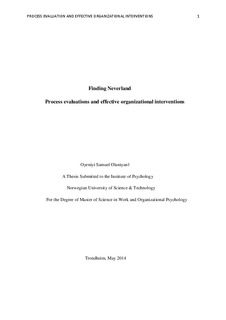Finding Neverland - Process evaluations and effective organizational interventions
Master thesis
Permanent lenke
http://hdl.handle.net/11250/283237Utgivelsesdato
2014Metadata
Vis full innførselSamlinger
- Institutt for psykologi [3103]
Sammendrag
The underlying structure of process evaluation and the predictors of employees’ satisfaction with an intervention was assessed using factor analysis and hierarchical multiple regression analysis. The management in an organization initiated the intervention to improve the psychosocial work environment and to raise employees’ competence in interpersonal relationships. The sample consists of 172 employees in an economy and real estate unit of an organization situated in central Norway. The sample consists of 49 % women and 51 % men with age ranging from 24 to 70 years. Results from the factor analysis produced a four-factor structure, but only two (process communication and process leadership role) of these factors were kept in the final analysis. The two process factors significantly predicted the level of employees’ satisfaction with the intervention after controlling for gender, personality, engagement, and commitment. Conclusively, these findings suggest that both the richness of communication and the roles of leadership influence participants’ appraisal as well as their satisfaction with the content of an intervention. Subsequently, future intervention programs ought to consider these two factors during the planning phase of an intervention.
